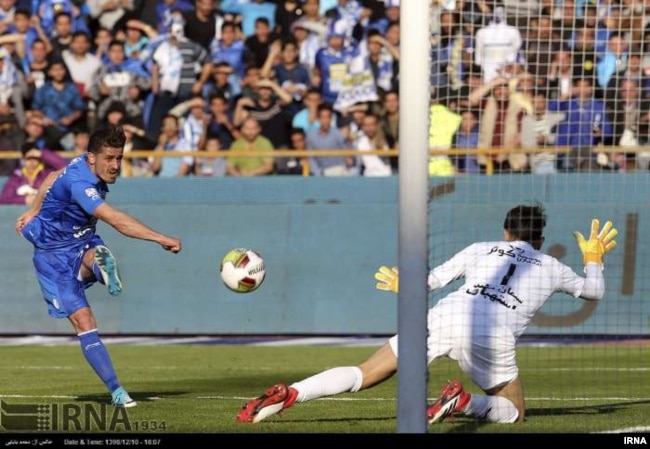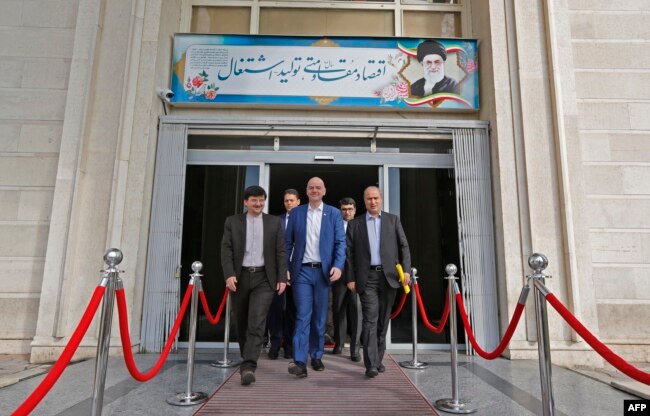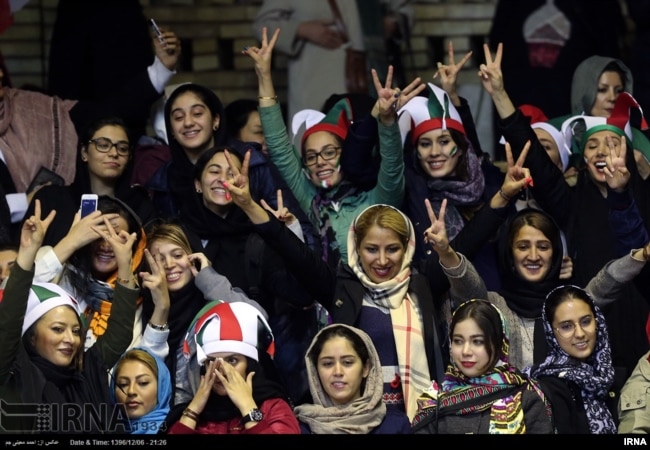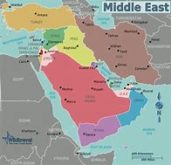VOA —Iran has blocked several dozen women from attending a major Tehran football match witnessed by the head of FIFA, the sport’s world governing body, prompting criticism from rights activists.
Iranian state news agency ISNA said police “transferred” 35 women who had gone to Azadi Stadium on Thursday to try to watch the match between local rivals Esteghlal and Persepolis.
Iran has been barring women from attending some men’s sporting events, especially football, since the first few years after its 1979 Islamic Revolution.
Iranian state media quoted interior ministry spokesman Sayyed Salman Samani as saying the 35 women detained at the stadium were not arrested but rather taken to a “proper place.” They were released at the end of the game.
 An Esteghlal player fires a shot against the Persepolis goalkeeper as spectators in the men-only stands watch two of Iran’s fiercest rival football teams play at Azadi Stadium in Tehran, March 1, 2018.
An Esteghlal player fires a shot against the Persepolis goalkeeper as spectators in the men-only stands watch two of Iran’s fiercest rival football teams play at Azadi Stadium in Tehran, March 1, 2018.
FIFA officials present
Esteghlal went on to beat Persepolis 1-0 in front of a capacity crowd of about 100,000 men at the stadium. FIFA President Gianni Infantino and technical director Marco Van Basten were among them.
Infantino and Van Basten were in Iran to celebrate the 100th anniversary of Iran’s football federation. Infantino also met with Iranian President Hassan Rouhani and sports minister Massoud Soltanifar.
Appearing at a joint news conference with Soltanifar earlier Thursday, Infantino spoke about keeping football free of politics.
 FIFA President Gianni Infantino, center, walks with Iranian Football Federation President Mehdi Taj, right, during his visit to the capital Tehran, March 1, 2018.
FIFA President Gianni Infantino, center, walks with Iranian Football Federation President Mehdi Taj, right, during his visit to the capital Tehran, March 1, 2018.
British news site Sky Sports News reported that Infantino also told the media that he wants to do something for Iranian women, especially because he has four daughters.
Van Basten previously has called for the ban on Iranian women at football stadiums to be lifted.
Article 4 of FIFA’s statutes reads: “Discrimination of any kind against a country, private person or group of people on account of race, skin color, ethnic, national or social origin, gender, disability, language, religion, political opinion or any other opinion, wealth, birth or any other status, sexual orientation or any other reason is strictly prohibited and punishable by suspension or expulsion.”
Infantino’s presence at Azadi Stadium drew sharp criticism from human rights activists who accuse Iran of violating FIFA rules by banning women from men’s matches. Geneva-based activist Hillel Neuer tweeted at FIFA, asking why it was “silent” on the matter.
Hillel Neuer
✔
@HillelNeuer
.@FIFAcom Your chief Gianni Infantino was at Tehran match today where #Iran detained 35 women for trying to attend. Your own Art. 4: “Discrimination on account of gender is strictly prohibited and punishable by suspension or expulsion.” Why are you silent? http://www.bbc.com/news/world-middle-east-43243414# …
11:07 PM – Mar 1, 2018
Iranian football fans at a match
Iran detains female football fans
The president of Fifa was also at the Azadi stadium in Tehran where the two women were held
bbc.com
162
134 people are talking about this
Twitter Ads info and privacy
Iranian women rights activists said they had hoped Infantino’s visit to the stadium would be an opportunity for female football fans to bring their complaints about the ban to his attention.
FIFA did not immediately respond to a request for comment from VOA’s Persian Service.
In an interview with VOA Persian on Thursday, Brussels-based Iranian activist Darya Safai said Iranian women have been trying to get into football stadiums for years, sometimes disguising themselves with facial hair to look like men. Safai is the founder of “Let Iranian women enter their stadiums,” a campaign to end gender discrimination at Iranian sporting venues.
Safai said the women detained at Azadi Stadium on Thursday were trying to watch the match with their male family members, a right that women had before the Iranian Revolution.
“I hope that Iranian men, as they have done before, will stand together with women to help them to get their rights back,” she said.
Iranian women watch the Iranian men’s basketball team play Iraq in a FIBA World Cup Asian Qualifier at Azadi Indoor Stadium in Tehran, Feb. 25, 2018.
 Iranian women have been allowed to attend some men’s sporting events. Women were among the fans who watched the Iranian men’s national basketball team face Iraq on Sunday in a FIBA Basketball World Cup 2019 Asian Qualifier at the Azadi Indoor Stadium, adjacent to the outdoor football arena. They were seated in a separate section from the male fans.
Iranian women have been allowed to attend some men’s sporting events. Women were among the fans who watched the Iranian men’s national basketball team face Iraq on Sunday in a FIBA Basketball World Cup 2019 Asian Qualifier at the Azadi Indoor Stadium, adjacent to the outdoor football arena. They were seated in a separate section from the male fans.
Ayatollah Naser Makarem Shirazi, a prominent Iranian religious leader, has been one of the strongest supporters of banning women from sporting venues. News site IranWire quoted him last December as telling students during a lecture that the presence of women in stadiums “inevitably” leads to morally corrupt acts.
In phone calls from Iran to VOA Persian’s Straight Talk show on Thursday, one man said that if women went to football stadiums, they would find their dignity violated by men shouting foul language and acting aggressively.
But other male callers supported efforts to end the football stadium ban, suggesting that men should insist on entering matches with their wives or daughters, or stop buying tickets altogether in protest.
One female caller said she sees irony in Azadi Stadium’s name, whose English translation is “freedom.”
“Isn’t it interesting that half of the people in the country are not allowed to go to a venue called ‘Azadi,’” she said.
Mohammad Naficy, Behrouz Souresrafil, Hooman Bakhtiar, Behrooz Samadbeygi and Afshar Sigarchi of VOA’s Persian Service contributed to this report.
Michael Lipin
Michael covers international news for VOA on the web, radio and TV, specializing in the Middle East and East Asia Pacific. Follow him on Twitter @Michael_Lipin
 Shabtabnews In this dark night, I have lost my way – Arise from a corner, oh you the star of guidance.
Shabtabnews In this dark night, I have lost my way – Arise from a corner, oh you the star of guidance.



